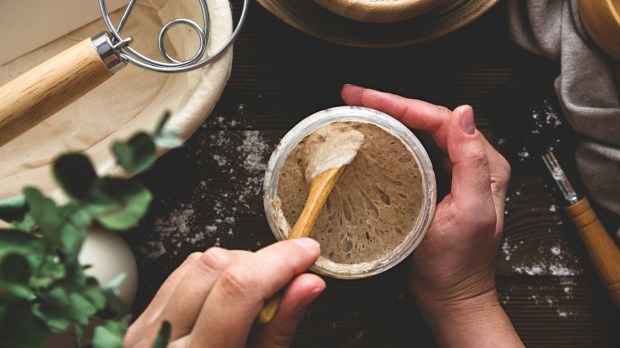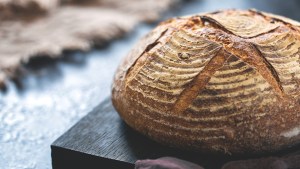When sourdough baking became all the rage during the 2020 pandemic, I didn’t jump on the bandwagon.
At the time, I had three little kids under the age of 5, and felt that I didn’t need one more thing to take care of!
But a few years later, when my kids were a little older and I felt I had more bandwidth, I (somewhat hesitantly) accepted the offer of some sourdough starter from a friend and took it home.
I was apprehensive, convinced that I would kill it or somehow mess up the process. But it turned out I had nothing to be afraid of.
After about two years of baking with sourdough, I’m here to share some good news: It’s almost impossible to kill sourdough. And baking with it is way easier than I ever imagined!
Maybe you’re in the same boat I was a few years ago. You’ve read about the health benefits and you want to bake with sourdough, but the whole thing just seems so complicated and confusing.
Listen, if you want to bake with sourdough, I promise you have what it takes. If Ma Ingalls could keep her sourdough starter alive while crossing the prairie in a covered wagon, you can, too.
Sourdough is the most ancient form of yeast, and people were baking with it before there was such a thing as printed books. I feel such a connection with history when I bake with sourdough, as our ancestors did millennia ago, and the time and effort invested feels like a gift of love we can give to our families.
You can do this! If you’re interested and want to give it a try, here are a few tips to get you started.
1
You don’t need to feed it all the time
One of the most stressful things for me when I started out with sourdough was thinking I needed to feed it twice a day for the rest of forever. “This is going to waste so much flour,” I remember thinking.
Actually, you do not need to feed it every day, or even every week or month. You can stick that starter in the back of your fridge and neglect it for months. It will be ready to bake with again whenever you want.
When you first get the starter, feed it and wait for it to rise. It should double in size and get bubbles all over the top. Then you can go ahead and pop it in the fridge, covered (I find that beeswax wrap is the best cover), and not touch it again until you want to bake with it.
Every time you want to bake with it, take it out of the fridge, take out the amount you need, then feed it and wait for it to double in size. Once it’s risen, stick it right back in the fridge. Boom. Done. No flour is wasted, no discard is ever thrown away, and there’s no endless babysitting of the starter.
2
You don’t need to stress over how much to feed it
When I first got my sourdough starter, I also got a kitchen scale and was obsessing over exactly how many grams of flour and water I needed to add at a time.
But remember how this stuff is borderline impossible to kill? At some point I realized that you just need to put in a larger quantity of flour than water (because water is heavier than flour) and that the amount can vary depending on how much starter you need for your next baking project.
Also, you can use up almost all your starter, leaving just a tablespoon or so in the bottom of the jar, and that starter will grow right back again.
Nowadays, here’s what I do. If there’s a good amount of starter in the jar, I add a heaping half-cup of flour and a level half-cup of water to feed it. If the jar is almost empty, I add a heaping cup of flour and a level cup of water. Always mix it in well (this is a great job for a preschooler, by the way). And that’s it!
3
You don’t have to make bread with it
When I first got my starter (which I named Kristin Leavens-dough-tter, by the way, after a book I love), I figured it was for making bread. I commenced producing a series of huge, crusty loaves … but it turns out my kids don’t like bread with huge crusts, and they would barely eat it before it went stale.
I quit making artisan loaves and switched to other things instead. And I’ve never looked back.
Nowadays, I make sourdough waffles or pancakes almost every weekend. My entire family loves these and they taste so much better than any other recipe we’ve tried.
A few times a month, I make sourdough pizza crust for homemade pizza, which is also a beloved favorite meal.
I make chocolate sourdough cake with homemade buttercream frosting for special occasions, like birthdays, and it’s my kids’ favorite cake in the world.
And I make sourdough naan pretty often as well. These are a great snack for on-the-go, as they don’t leave crumbs, and you can use them as a base for pizzas made on the grill in the summertime. My kids and their friends love these!
There are so many other options… sourdough banana bread, sourdough muffins, sourdough sandwich bread, sourdough Dutch baby pancakes… the list goes on! If you don’t want to make big crusty artisan loaves, you can get all the gut health benefits of long-fermented sourdough foods in so many other ways.
I hope all this information I’ve learned through trial and error is helpful for you. And if you need some sourdough starter to begin your own baking journey, you know who to ask! Good luck!



